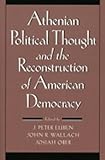Athenian Political Thought and the Reconstitution of American Democracy / ed. by John R. Wallach, J. Peter Euben, Josiah Ober.
Material type: TextPublisher: Ithaca, NY : Cornell University Press, [2018]Copyright date: ©1995Description: 1 online resource (360 p.)Content type:
TextPublisher: Ithaca, NY : Cornell University Press, [2018]Copyright date: ©1995Description: 1 online resource (360 p.)Content type: - 9781501723995
- Democracy -- Greece -- Athens -- History
- Democracy -- United States
- Democracy
- Elite (Social sciences)
- Legitimacy of governments
- Political participation
- Political stability
- Representative government and representation
- Political Science & Political History
- U.S. History
- HISTORY / United States / General
- 321.8 20
- JC79.A8 A86 1994
- online - DeGruyter
| Item type | Current library | Call number | URL | Status | Notes | Barcode | |
|---|---|---|---|---|---|---|---|
 eBook
eBook
|
Biblioteca "Angelicum" Pont. Univ. S.Tommaso d'Aquino Nuvola online | online - DeGruyter (Browse shelf(Opens below)) | Online access | Not for loan (Accesso limitato) | Accesso per gli utenti autorizzati / Access for authorized users | (dgr)9781501723995 |
Frontmatter -- CONTENTS -- Introduction -- I. Democracy and Regimes of Power -- 1. Norm and Form: The Constitutionalizing of Democracy -- 2. Democracy: An Idea of Ambiguous Ancestry -- 3. The Creation of a Legacy: A Manufactured Crisis in Eighteenth-Century Thought -- 4. Democracy, Power, and Imperialism in Fifth-Century Athens -- II. Critical Discourse in Athenian Democracy -- 5· How to Criticize Democracy in Late Fifth- and Fourth-Century Athens -- 6. Frank Speech, Democracy, and Philosophy: Plato's Debt to a Democratic Strategy of Civic Discourse -- 7. Democracy and Political Theory: A Reading of Plato's Gorgias -- III. Athenian Ideals and Contemporary Issues -- 8. The Tragedy of Critical Theory -- 9. The Melting Pot, the Mosaic, and the Agora -- 10. Athenian Political Thought and the Feminist Politics of Poiesis and Praxis -- 11. The Zero Degree of Society: Aristotle and the Athenian Citizen -- 12. Two Democracies and Virtue -- SELECTED BIBLIOGRAPHY -- CONTRIBUTORS -- INDEX
restricted access online access with authorization star
http://purl.org/coar/access_right/c_16ec
In the contemporary United States the image and experience of Athenian democracy has been appropriated to justify a profoundly conservative political and educational agenda. Such is the conviction expressed in this provocative book, which is certain to arouse widespread comment and discussion.What does it mean to be a citizen in a democracy? Indeed, how do we educate for democracy? These questions are addressed here by thirteen historians, classicists, and political theorists, who critically examine ancient Greek history and institutions, texts, and ideas in light of today's political practices and values. They do not idealize ancient Greek democracy. Rather, they use it, with all its faults, as a basis for measuring the strengths and shortcomings of American democracy. In the hands of the authors, ancient Greek sources become partners in an educational dialogue about democracy's past, one that goads us to think about the limitations of democracy's present and to imagine enriched possibilities for its future.The authors are diverse in their opinions and in their political and moral commitments. But they share the view that insulating American democracy from radical criticism encourages a dangerous complacency that Athenian political thought can disrupt.
Mode of access: Internet via World Wide Web.
In English.
Description based on online resource; title from PDF title page (publisher's Web site, viewed 26. Apr 2024)


